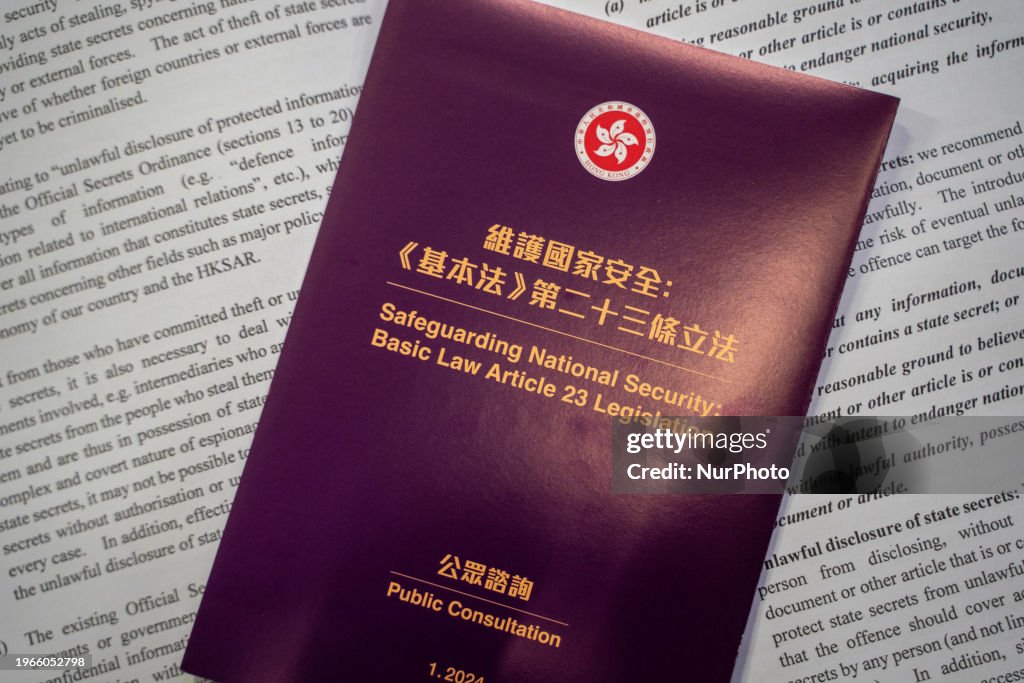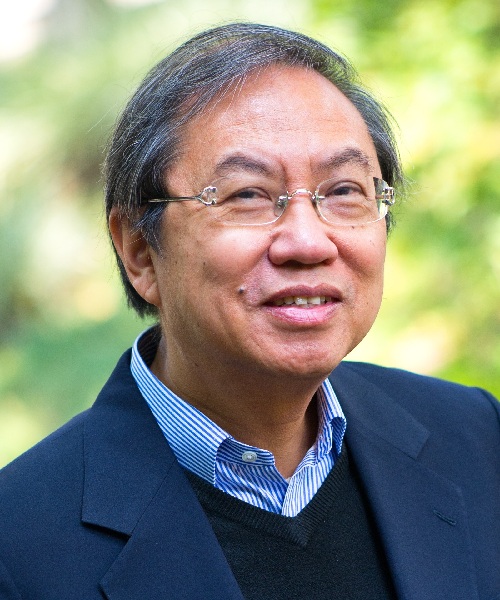Efter att demonstrationerna i Hongkong för öppenhet, demokrati och självstyre slagits ned, antog regeringen i Peking 2020 en lag som gör all radikal politisk opposition olaglig. (https://en.wikipedia.org/wiki/Hong_Kong_national_security_law). Nu har också den politiska ledningen i Hongkong under John Lee antagit en lag, känd som “Article 23”, som ytterligare understryker att ingen verklig oppositon tillåts. I en artikel specialskriven för Mänsklig säkerhet kommenterar här professor Joseph Yu-shek Cheng vad detta betyder. Vi publicerar här artikeln i den engelska originalversionen.
Article 23 Legislation: a Sad Historic Moment
Hong Kong’s Article 23 legislation became effective on March 23. The entire establishment came out in loud applause. The president of the Legislative Council, Andrew Leung Kwan-yin, broke the convention and voted in support as the legislature passed the bill unanimously. The Western world and the international media generally criticised the legislation severely, while the local community remained silent.
In 2003, the C.H.Tung administration withdrew the bill after massive protests involving over half a million people and the pro-business Liberal Party withdraw its support. The pro-democracy camp did not have a majority to block the passage of the proposed legislation then. Today there are no public protest activities and no representation of the pro-democracy movement in the legislature. The government claimed that 98 percent of the responses it received supported the legislation. But it cut short the normal consultation period and the legislature completed its debates in just over eleven days. The first draft of the bill had 212 pages.

Photo: Booklets on the Article 23 Legislation Public Consultation are being displayed in Hong Kong, on January 30, 2024. (Photo by Vernon Yuen/NurPhoto via Getty Images).
Purpose of Article 23: to deter from dissent
This new National Security Law attempts to deter and crack down on various forms of dissent on the grounds of alleged treason, insurrection, sabotage that endangers national security, sedition and external interference in the territory’s affairs, and espionage and theft of state secrets. These crimes may be penalised by life sentences and imprisonment of up to twenty years.
The John Lee administration explained that the legislation is necessary to prevent the occurrence of protests like those in 2019 and to plug loopholes in the existing legislation. But the National Security Law in 2020 already completed the tasks. While in 2019 and before, pro-establishment figures lamented that Hong Kong had become “ the capital of demonstrations”, in the recent three or four years, there are practically no public protest activities. Pro-democracy parties either ceased to exist or operate so much so that there is no opposition in the legislature. Civil society groups like the Hong Kong Professional Teachers’ Union have been disbanded; and there are no severe criticisms of Beijing and the Hong Kong government in the mainstream media.
Demonstration of loyalty to the leadership in Beijing
Apparently the John Lee administration is eager to demonstrate that it can deliver what the Chinese leadership wants efficiently, hence the speedy completion of the Article 23 legislation process. Beijing intends to demonstrate who is in control and what its priorities are. It is significant that the business representatives in the Legislative Council overwhelmingly supported the legislation, and even the foreign chambers of commerce declined to articulate their concerns openly.
Obviously the Chinese leadership accords a higher priority to national security than Hong Kong’s stability and prosperity; and such priority reduces the influence of the business community, local and foreign. This means that the territory will become increasingly dependent on the Mainland China economy, which in turn will erode the local bargaining power. While all parties concerned realise that the Hong Kong economy has not recovered as well as those of its neighbours, the discussion of its recovery strategy has not been frank.
The pro-democracy movement no longer dares to articulate its demands for democracy and human rights; and civil society activities have been reduced to a minimum. Yet the territory remains an important international financial centre and the business and financial community has its serious worries. For a complicated bill like the Article 23 legislation, it is important that the basic provisions are clearly defined. Serious and detailed discussions are essential. Yet they are far from adequate because the authorities do not want to encourage or accept such deliberations.
For example, according to the new legislation, inciting hatred against the Chinese Communist Party leadership may carry a penalty of up to ten years in jail. Both financial analysts and journalists are concerned. They are worried that criticisms of Chinese fiscal and financial policies and even adverse comments on corporations owned by the Party and state can get them into trouble.
The theft of state secrets is another issue of common concern. The new law forbids the unlawful acquisition, possession and disclosure of state secrets; and the latter covers the “economic or social development “of both Mainland China and Hong Kong. One critic observes that this almost includes everything.
Reactions among the general public: self-censorship and voting with one’s feet
The reluctance of the Hong Kong government to clarify the issues generates a deterrence effect. Since the interest groups concerned dared not or failed to push the government to clarify the issues to their satisfaction, their members tend to exercise self-censorship. And this is probably what the John Lee administration wants.
The Lee administration has been encouraging an informant culture prevalent in most authoritarian regimes. Teachers for example have been seriously affected. If they say something considered politically incorrect in class, their students may report back to their parents who in turn may complain to the authorities. The teachers concerned may lose their professional licences and even be prosecuted. This makes the teaching profession a dangerous vocation, and numerous resignations have resulted in a shortage of teachers despite a decline in the number of students caused by demographic trends. Voting with one’s feet is another option besides self-censorship.
This exodus has been widely reported; and the government has responded with schemes to attract talents overseas. But it seems that these schemes mainly attract professionals from Mainland China.
Concern about the impact on the rule of law
The community is most concerned with the impact of the national security laws in 2020 and 2024 on the rule of law in Hong Kong. This is also a very important consideration of the foreign business community. The former National Security Law removes the provision of the jury for relevant cases, and they are adjudicated by national security judges designated by the government. Normally the prosecuted is denied bail. The cases may be trialed in Mainland China too, though no precedent has been set. The government usually appeals when it loses the first trial; this means that the prosecuted will be detained often for two years while awaiting trial and further detained while waiting for the government’s appeal even if he or she wins the case in the initial trial.
The new National Security Law allows the prosecution to detain suspects without charges for sixteen days instead of the normal forty-eight hours, thus further eroding the basic rights of those arrested for alleged violations of the National Security Law. Another loophole blocked by the new law is the facilitation of the government to take actions against Hong Kong residents and businesses for their alleged national security crimes overseas.The passports of the people concerned may be invalidated.
Upon the passage of the National Security Law by the Legislative Council, the Chief Executive, John Lee, declared that this was a “historic moment” for Hong Kong. Many people in the territory probably agree with him, though they consider this a very sad historic moment. A popular black joke in the territory has been that it is now the historic site of an important international financial centre.

Joseph Yu-shek Cheng, professor, under många år ledande statsvetare i Hongkong, dekan för den samhällsvetenskapliga fakulteten vid City University of Hong Kong, och en förgrundsgestalt för demokratirörelsen. Tidigare rådgivare vid universitetet i Åbo och nu senior research fellow vid ISDP, Institute for Security and Development Policy, i Stockholm. 2023 gav han ut sjäkvbiografin Struggling for Democracy in Hong Kong. My story. Professor Cheng bor nu i Auckland, Nya Zeeland.
Redaktör: Torbjörn Lodén
Vill du skriva en text där du kommenterar, diskuterar eller kritiserar detta inlägg? Kontakta redaktionen på red.manskligsakerhet@gmail.com.
Ge ett frivilligt bidrag till vår redaktion och stötta fler nytänkande perspektiv på säkerhetsfrågor! Swish: 123 383 91 31, Banköverföring: SEB 5215 – 1116611

Lämna ett svar